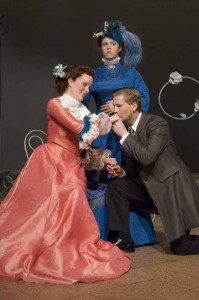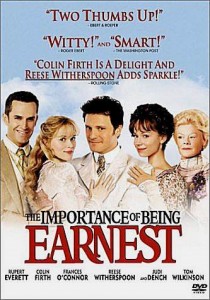
The Importance of Being Earnest
How do identity and masculinity intersect in the play?
Of The Importance of Being Earnest, Wilde wrote:
It is exquisitely trivial, a delicate bubble of fancy, and it has it’s philosophy … that we should treat all the trivial things of life seriously, and all the serious and studied things of life with sincere and studied triviality.(2)
At first sight The Importance of Being Earnest may appear to be the trivia Wilde claims of it. Despite this it is has been stated as the most perfect play Wilde wrote, and also the best British play of the 19th Century.(3) Although written in a style that makes it appear like an upper class drawing room comedy, it expresses several powerful themes. At the beginning, for instance, one of the major themes is introduced in the conversation between Jack and Algernon. Jack, we learn, at times becomes a young man called Ernest. Algernon, also, leaves one persona to do what he calls Bunburying, and eventually becomes Earnest also.
This difficulty with a specific identity is heightened in the play by the muddle over who exactly is Ernest. Both men reject and want the name – want it because it is desirable to the woman they wish to marry. But the irony of this is increased by the meanings of the name itself. These are a) serious; ardent or not joking, perhaps even being sincere. b) money paid to confirm a contract, or as an instalment. As the name is a central point regarding marriage to women with money and status, the contract side of the name is relevant. The sincere meaning of the name is an irony in that the men are, to start with, anything but sincere or truthful.
For Jack, the name also links with his lack of information about his birth, and therefore his true family background. This ties the name powerfully with the theme of identity. A factor in this is amusingly enacted when Lady Bracknell questions Jack about his habits, his income and his background. Perhaps this is why Wilde used the word trivia.
JACK. Well, yes, I must admit I smoke.
LADY BRACKNELL. I am glad to hear it. A man should always have an occupation of some kind. There are far too many idle men in London as it is.(5)
After more such frivolous responses to equally ridiculous replies, Lady Bracknell asks Jack about his family background. Despite her willingness to accept Jack as her son-in-law on the basis of replies that show him as a complete loafer, when he gives details of his birth she says:
LADY BRACKNELL. … To be born, or at any rate bred, in a hand-bag, whether it had handles or not, seems to me to display a contempt for the ordinary decencies of family life that reminds one of the worst excesses of the French Revolution. And I presume you know what that unfortunate movement led to? As for the particular locality in which the hand-bag was found, a cloak-room at a railway station might serve to conceal a social indiscretion – has probably, indeed, been used for that purpose before now-but it could hardly be regarded as an assured basis for a recognised position in good society.(6)
JACK. That is nonsense. If I marry a charming girl like Gwendolen, and she is the only girl I ever saw in my life that I would marry, I certainly won’t want to know Bunbury.
ALGERNON. Then your wife will. You don’t seem to realise, that in married life three is company and two is none.(8)
In most of these exchanges Jack is making comments to which Algernon gives clever and perhaps cynical replies. This can be seen as argument, or as a technique to enable the character Algernon to express particular comments about social habits or traditions such as marriage. The suggestion in the above is that there is no real happiness in marriage, and to make it work one must have other people involved, or the excuse to escape its demands. This idea is also suggested later:
|
Oscar Wilde |
|
LADY BRACKNELL. I’m sorry if we are a little late, Algernon, but I was obliged to call on dear Lady Harbury. I hadn’t been there since her poor husband’s death. I never saw a woman so altered; she looks quite twenty years younger.(9) Once more this is a clear suggestion that marriage is a burden, and the woman has regained her life and health now her husband is dead. Taking this together with the text stating how one attains recognition through social status, the implication is that from a mature woman’s point of view, a man is simply someone to gain social respectability and status through, and possibly benefit from economically. From the male point of view – as suggested by the play – a woman is a highly desirable creature. But marriage is something within which one must have plenty of room for independence. True love need not be forever. A cryptic remark to this effect is made by Gwendolen. Having been asked by Jack if her decision about his name is irrevocable, she says: |
GWENDOLEN. I never change, except in my affections.
CECILY. What a noble nature you have, Gwendolen!
These whimsical contradictions in the same sentence occur too often to be an accident. They lead one to look behind the stage curtain of the wit to see from what it arose. I never change except in my affections – means there is no constancy; although it also suggests the speaker believes they are in some way constant. Looking to an overall sense of the play from this and the other quotes, and aligning it with the question of identity and masculinity, some things stand out. The flippancy hides a deep cynicism or self doubt. The humour, if it is reduced to straightforward statements, is saying that relationships, social status, money as a means of personal worth, are all shams and are ridiculous.
Those may be criticisms or mockery of the society or upper class of the time. But there is a more profound suggestion to be found, not so much in any one statement in the text, but in the very farcical nature of the statements made. Behind the frippery, hiding behind the lightness and froth, is a darkness of spirit. This is seen in the suggestion that a man can find no satisfying identity except by the use of profound intellectual wit. Life, relationships, status, have no meaning, so the wisest thing is to mock them. “… that we should treat all the trivial things of life seriously, and all the serious and studied things of life with sincere and studied triviality.” “Sincere and studied triviality” – those are the key words. Scorn all of it. Stand aside and mock, but do so with great intellect, or else you too are a fool and trivial.
Ref: 1 – 2
Bibliography
Edward W. Said. The World, The Text and the Critic. Vintage. UK. 1991.
Infopedia UK ’96. Hutchinsons New Century Encyclopaedia. CD ROM edition.
Oscar Wilde. The Importance of Being Earnest – the Project Gutenberg Etext of the play, scanned and proofed by David Price ccx074@coventry.ac.uk. Website – http://www.promo.net/pg/.
Oscar Wilde. The Importance of Being Earnest. Penguin Books. UK. 1994.
The Importance of Being Earnest. Notes by Christopher Nassaar. Longman. UK. 1980.
(1)
Notes
Oscar Wilde. The Importance of Being Earnest. Penguin Books. UK. 1994.
(2)
Oscar Wilde. The Importance of Being Earnest. Penguin Books – frontispiece.
(3)
“… his masterpiece” – frontispiece The Importance of Being Earnest. Penguin Books. “It stands today as the best play that Great Britain produced in the nineteenth century.” Christopher S. Nassaar . The Importance of Being Earnest. Longman. UK. 1980.
(4)
Oscar Wilde. The Importance of Being Earnest. Penguin Books. Page 8.
(5)
Oscar Wilde. The Importance of Being Earnest. Penguin Books. Page 20.
(6)
Oscar Wilde. The Importance of Being Earnest. Penguin Books. Page 22.
(7)
The Importance of Being Earnest. Notes by Christopher Nassaar. Page 34.
(8)
Oscar Wilde. The Importance of Being Earnest. Penguin Books. Page 14
(9)
Oscar Wilde. The Importance of Being Earnest. Penguin Books. Page 15.


